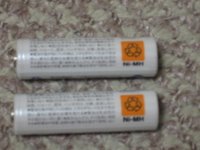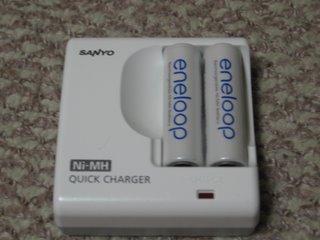Public Service Announcement: Batteries
~Here is a quick post aimed at all of you dinosaurs still living in the 20th century. Simply put: alkaline batteries are OUT. Yes, those trusty alkaline double-A's you've been buying from the grocery store for who knows how many years are completely outdated. Today's Word of the Post is 'denchi' (den-chi), which is Japanese for battery, and I think it's time that YOU made the switch to rechargables for all your battery needs.
The camera I use to take pictures for this blog is a Canon PowerShot A520, and it came with a pair of Canon alkaline AA batteries. They lasted me perhaps a week. Then I went through two packs of batteries, which set me back 1,600 yen (around $15), and they were still burning out ridiculously fast. I thought I was doing something wrong; was I using the flash too much? Should I disable the LCD screen? However, after reading up a bit on digital cameras, I realized that they are tremendously power-hungry devices. Those LCD screens, auto-focusing lenses, and powerful flashes use up a lot of juice, and time and time again, photography websites recommended a switch to rechargable batteries.
I know what you might be thinking (I was thinking it too): "Rechargable batteries suck! They're not nearly as powerful as the Energizers (or whatever) that I usually buy!" Until just a few years ago, you would have been correct: older rechargable batteries had only a fraction of the capacity of standard alkalines. Now, however, the situation is reversed. The best modern consumer batteries use Nickel Metal-Hydride (NiMH) cells which are vastly superior to older rechargable batteries for sale a few years ago. Although it's a bit late for Earth Day, I'll give you some good reasons to toss those copper-tops for good:
- They will save you money. The price of good rechargable batteries has fallen to not much more than alkalines, and they can of course be recharged, for perhaps a thousand times. This will save you hundreds of dollars over the years for each set you use.
- They last longer--a LOT longer. For example, a pair of AA Energizers in my digital camera allows me to take around 70 pictures, or half that with the flash on. With NiMH batteries, I can take well over 300 shots: over four times as much.
- They provide superior performance in cold conditions, when most other batteries die (like my cellphone). This is an important consideration for photography and outdoor use.
- They are better for the environment. Batteries are some of the nastiest pieces of trash that human civilization produces, containing toxic metals and corrosive acids. Not only do NiMH batteries last thousands of times longer (and thus create less trash), they can be recycled:

Recharging the batteries is ridiculously simple. For the equivalent of about $16 (about what I spent on disposable batteries for the camera), I purchased a Sanyo 'Eneloop' quick charger, which came with two AA-sized NiMH batteries, from a department store here in Nagaoka:
 ^ When the batteries die (which has happened just once in the month that I've had them, despite all the pictures I've been taking), all I have to do is pop them in the charger, plug it into the wall and wait until the red light on the charger goes off...which is usually around two hours later. Bigger chargers can charge many more batteries simultaneously, and even batteries of different sizes. What's that? Two hours is too long for you? No problem: this charger will get the job done in just 15 minutes!
^ When the batteries die (which has happened just once in the month that I've had them, despite all the pictures I've been taking), all I have to do is pop them in the charger, plug it into the wall and wait until the red light on the charger goes off...which is usually around two hours later. Bigger chargers can charge many more batteries simultaneously, and even batteries of different sizes. What's that? Two hours is too long for you? No problem: this charger will get the job done in just 15 minutes!Another benefit of the newer NiMH batteries is that they don't self-discharge as much as older rechargable batteries, which gradually lost their charge and would be completely drained after a couple of months (which was the major argument in favor of continued use of alkaline batteries). The new ones, however still retain 85% capacity after an entire year of non-use, so no worries there.
So please, take a moment to mentally list the battery-powered electronics you use on a regular basis, and consider switching to modern, rechargable batteries. Do yourself a favor: you'll save money, get more use out of your electronic stuff, and put a little less toxic trash out into the world. Aside from cameras, here are some ideas to get you started:
- TV remotes (imagine never digging around for fresh batteries again--just pop them in the charger!)
- Flashlights, especially those you use outdoors in cold weather
- AM/FM radios
- Toys, such as remote controlled-cars and portable video-game systems
- Camcorders
- Battery-powered wireless devices such as wireless headphones, computer mice, and keyboards

